As a long-time fan of self-professed ‘song and dance man’ Bob Dylan I was pleased to see him awarded the coveted Nobel prize for literature - and subsequently amused to see that the Nobel committee gave up trying to contact the enigmatic and unpredictable artist about it after three fruitless days of trying!
Despite Dylan’s massive back catalogue of incredible work over a half century or so (best album ever, by the way, was 1975’s Blood on the Tracks. Just saying...) media the world over reporting the Nobel prize harked back to his early 1960s days as a so-called protest singer. His anthemic ‘Times they are a-changing’ was extensively played - and, not having heard this song for a while, its lyrics resonated in my mind as I mulled over this Comment.
“Please heed the call/don’t stand in the doorway, don’t block up the hall/for he who is hurt will be he who has stalled/there’s a battle outside and it’s raging/it’ll soon shake your windows and rattle your walls/For the times....”
Hmm. For he who is hurt will be he who has stalled. Whether this line strikes a chord with you on one side or the other in the dispute between Southern and the RMT union, or about DB Cargo as it prepares to cut a third of its workforce, reduce its fleet of locomotives and wagons and close depots nationwide, will depend on your point of view. But the times are a-changing very rapidly indeed in both passenger and freight, and so despite rail’s undoubted overall success, turbulence continues. The Southern dispute seems doomed to grind on relentlessly, while a third of the DBC workforce - 893 people - look set to pay with their jobs for what drivers’ union ASLEF clearly - with some justification - believes is the company’s complacent and laggardly approach to innovation and new business.
The freight traffic for which railways were invented is in trouble. The commodity for which the iron road was born in northeast England in the early 19th century was coal. Millions of tons of it, which drove Britain’s industrial revolution, warmed homes blazing in open grates and - crucially - in the last half of the 20th century fuelled power stations.
That voracious appetite bred, I suspect, a dangerous reliance in our rail freight industry on coal. In the 1950s, when yards such as Toton handled a million 16-ton wagons a year, largely from the Nottinghamshire coalfield alone, it doubtless seemed like it would never end. It held up well into the 1990s and this meant that the understandable (but nevertheless rather complacent) ‘we’ll always have coal’ philosophy deeply embedded in BR’s DNA passed to what became our largest freight operator - now DB Cargo. This company has seemed to be the slowest to adapt, develop and innovate in the only truly privatised part of our freight operating industry.
Having watched privatised freight from its earliest days of English Welsh & Scottish Railway, under the leadership of Chairman Ed Burkhardt (who brought Wisconsin Central’s ‘we can’ attitude to this sector) and Managing Director Ian Braybrook (whose BR experience was the perfect foil for Burkhardt), it seems to me that the company’s once crusading spirit, energy and drive has disappeared.
Conversely, our other two principal freight operators, Freightliner and GBRf did not inherit any sort of reliance on coal. At the time of privatisation Freightliner was regarded kindly, but almost with pity, as a financial and operational ‘basket case’. It was vested with a sorry fleet of smoky old unreliable Class 47s and what were seen as a collection of clapped out container ‘flats’. Its business of transferring ‘boxes’ between ports was seen as too restrictive with wafer-thin margins that would not sustain a growing business. GB was launched largely to give then-Railtrack a more reliable infrastructure train supplier than EWS, which had frustrated Railtrack by poor performance and reliability on engineering trains. So, neither GB nor Freightliner inherited the ‘we’ll always have coal’ stance that permeated too much post-Burkhardt thinking at EWS and DBS/DBC. Both smaller companies were more agile, more innovative, more energetic and more effective in developing successful businesses.
We all know coal was in decline for power generation - but the railway cosily assumed a long slow gentle glide path: what it got was a rapid crash dive and a very hard landing. Over the last two years, DBC UK has lost a thumping 85% of its coal revenues. This year, up until the end of September, DBC ran just 1,353 coal trains - last year the figure was 6,163. The company proposes to cut 893 jobs. including 391 drivers, 245 ground staff and 122 managers.
No, DB cannot ‘buck the market’, which has undoubtedly changed around it. But the familiar comfort of seemingly endless coal blunted the drive for innovation and commercial agility that Freightliner had to dig deep and find to overcome its appalling launch legacy, and which has always oozed from GB’s every pore under founder/Chief Executive John Smith’s inspired, energetic and successful leadership.
I have said it here before, but the calamitous collapse in coal could be the spur for the industry as a whole to come up with a burst of genuinely new innovation in operations, traffic and approach that will give freight a badly-needed new direction. But the cost is high.
Meanwhile, the Southern guards dispute goes from bad to worse, with the mind-numbing spectacle of the RMT on the one hand recommending that its members accept new roles while at the same time continuing to strike about them. As this issue of RAIL closed for press the dispute was still mired in disagreement. It’s a classic case of wretched passengers being trapped between the rock of the Government’s determination to modernise the railway and the hard place of the RMT’s outright refusal to agree to the sort of driver-controlled trains which have run on different parts of the same network since 1988, and which in much more extreme form of that now proposed successfully and safely carries four million people every working day on the London Underground. Siemens tells me, by the way, that 85% of all new metro trains it builds for non-UK railways have driver-controlled doors.
Anyone thinking the Government - whose concession contract effectively mandates Southern to introduce driver train control - will give way soon for political reasons should perhaps think again. All DfT Invitations to Ttender for new franchises now include clauses requiring exactly the same form of driver train control for all new British trains.
The Hitachi AT200s for ScotRail were likewise designed for driver passenger control - but the recent climbdown north of the border in a similar dispute with the RMT has made a costly redesign by Hitachi necessary. The DfT is determined not to repeat this. Meanwhile, passengers’ lives continue to be wrecked by this seemingly intractable, bitter dispute.
Changing times indeed for both passenger and freight sectors. Big thinking is needed.
Comment: RAIL 812: October 26 2016 - November 8 2016

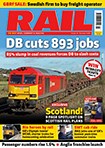
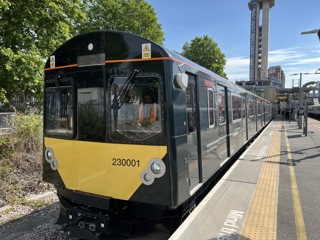
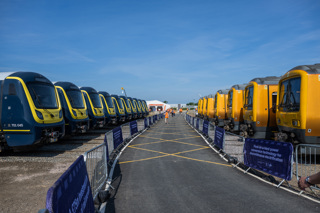
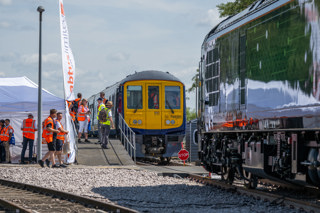
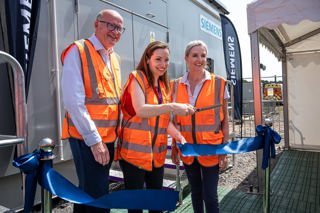
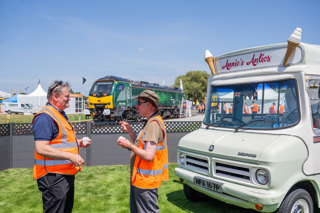








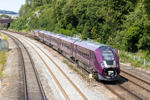


Login to comment
Comments
No comments have been made yet.